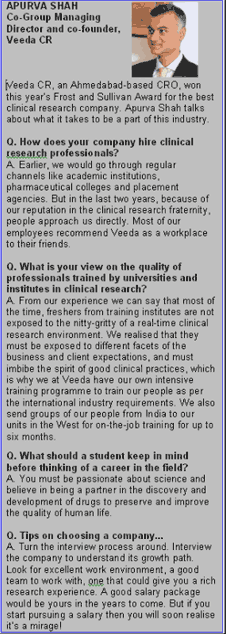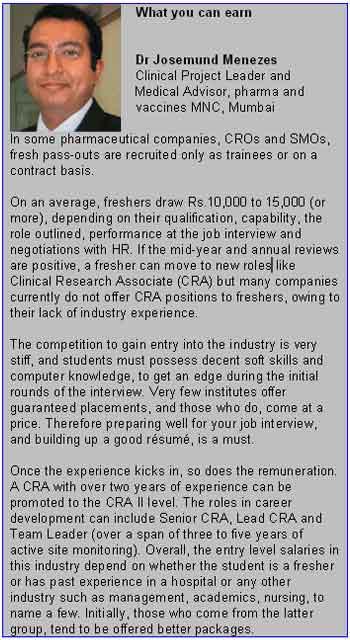 | « Back to article | Print this article |
Careerscope: Developing the drugs of tomorrow
India's pharmaceutical and biotechnology industry is booming. Drug companies such as Biocon have made the world stand up and take notice of this sector.
And according to the recent FICCI-Ernst & Young report, the Indian pharmaceutical market will experience a compounded annual growth rate of 12.3 per cent, and triple its worth to $20 billion by 2015, thus catapulting India into the world's top 10 markets.
No wonder MNCs such as Pfizer, Roche, Novartis and Sanofi, to name a few, have already established a base in India, having gauged the huge potential that the country offers.
This in turn has fuelled the growth of clinical research, a nascent industry estimated to be worth close to Rs 100 plus crores today but with a huge potential, which in turn offers myriad job opportunities.
What is clinical research?
When a drug is found to be effective under laboratory conditions, it cannot be directly launched in the market. It is first tested on animals, then human beings (healthy volunteers/patients) through a series of trials to find out whether it is safe to be administered. The sample size of volunteers is increased till adequate information has been gathered.
"Clinical research thus refers to the process, which is basically the evaluation of how effective or useful a new drug, vaccine, diagnostic test, new device or surgical technique, can be in humans," says Dr SC Sehgal, who is the head of the clinical research department at Sharda University.
Clinical trials usually involve a sizable expenditure that is taken care of by the sponsor, usually a governmental organisation, pharmaceutical or biotechnology company. Often a clinical trial is managed by an outsourced partner such as a contract research organisation (CRO) that has a gamut of professionally qualified task force to handle the trial.
India, a commercially viable clinical trial destination
 A few years back, clinical research courses were completely unheard of. Most of the industry specialists with a science or medical specialisation, learnt on the job. But the situation has changed in the past five years with every country drafting its own guidelines and laws for clinical trials.
A few years back, clinical research courses were completely unheard of. Most of the industry specialists with a science or medical specialisation, learnt on the job. But the situation has changed in the past five years with every country drafting its own guidelines and laws for clinical trials.
Dr Josemund Menezes, Clinical Project Leader and Medical Advisor with a multinational pharma and vaccines company in Mumbai says, "The number of trials approved by the Drugs Controller General of India is on the rise, with India becoming a one-stop destination for many disease indications, and both MNC and Indian companies eager to conduct multinational multi-centric trials here. India offers cost advantage, as well as quicker completion of trials." India's vast population no doubt offers a larger pool of volunteers.
Although initially, sponsors and CROs were driven to offshore locations due to their cost advantage, the focus has now shifted, opines Apurva Shah, Co-Group Managing Director, Veeda CR, an Ahmedabad-based CRO.
"Earlier only preliminary work was being outsourced to India but because of our depth in scientific knowledge and experience in drug development we have moved up the value chain and are now adding value to drug development by providing scientific inputs and innovative drug designs," he said.
Who is eligible?
This subject is usually offered at a postgraduate level to life science graduates (biochemistry, pharmacology, toxicology, biotechnology, microbiology or zoology), doctors (MBBS, BVSc, BDS, BAMS, BHMS) bachelors in physiotherapy, pharmacists (BPharm, MPharm) and nursing graduates, since they are in a better position to understand the nuances of the course.
The course
One can opt for a full-time two-year MSc in clinical research, offered by many prominent universities after graduation. You can also go for diploma and certificate courses for further specialisation such as advanced courses in pharmacovigilance (safety) or advanced courses in clinical data management and statistics.
These courses usually cover the entire gamut of drug development from pre-clinical to post-marketing activity, trial design, and life cycle of a trial, the regulations involved, ethics, good clinical practices (GCP) and an understanding of the various services offered under clinical trials.
Typically, the selection procedure for most courses is a qualifying written examination followed by a personal interview, to gauge level of interest and aptitude. However, the courses are not standardised, a concern that is voiced by some. Dr Anant Bhan, a Pune-based independent researcher with a specialisation in bioethics and public health feels that we need to have a good regulatory framework in place. Though the mechanism is in place for the drug approval process.
Choosing an institute
With several institutes offering clinical research courses, zeroing in on where you want to study becomes all the more important. Dr Vijay Moza, chairman of CREMA, a Mumbai-based institute which offers clinical research courses, recommends a good faculty, and a curriculum that delivers. The placements is also a very important criterion.
Industry interaction is very important, stresses Dr Ashok Kolaskar, former Vice Chancellor of Pune University and professor of Bioinformatics. "We are looking at creating individuals with skill sets. Hence we brought in experts with hands-on experience in the industry," he says, talking of the course currently being managed at Goa University in collaboration with Bioinnovat Research Services, a Delhi-based knowledge resource company.
"Students should see to it that they get practical exposure, go to the sites (usually a hospital or a research organisation) where the trial is conducted. In other words, industrial training is very important," says Pooja Puri, who passed out from a prominent clinical research institute this year.
Job opportunities
 Many allied sectors offer opportunities after completing a course in clinical research and the numbers are on the rise. "The employment of manpower is the highest in the R&D at biopharmaceutical companies, which are always on the lookout for new drug candidates," says Guljit Chaudhary, Managing Director of Bioinnovat Research services.
Many allied sectors offer opportunities after completing a course in clinical research and the numbers are on the rise. "The employment of manpower is the highest in the R&D at biopharmaceutical companies, which are always on the lookout for new drug candidates," says Guljit Chaudhary, Managing Director of Bioinnovat Research services.
Biopharma includes companies such as Eli Lilly, GSK and Ranbaxy. CROs, as the name suggests, offer a wide range of "outsourced" pharmaceutical research services to pharmaceutical industries and hence are the next big employers of clinical research professionals.
These include SIRO Clinpharm, Veeda CR, Clinigene as well as MNCs such as Quintiles and Kendle. You can also work in government laboratories or non-profit organizations, working towards development of new vaccines, drugs, etc. Trial management organisations are yet another option. These offer a range of services to CROs, pharma and biotech companies and even sites.
Job profiles
A fresh graduate from a clinical research course can join as a Clinical Project Assistant/in-house CRA (clinical research associate) in a pharma company or CRO/Site Management Organisation. A CRA typically ensures compliance with the clinical trial protocol, checks clinical site activities, makes on-site visits, reviews Case Report Forms (CRFs) and communicates with clinical research investigators. A CRA does not work on the site, itself, but monitors a clinical trial.
Clinical Research Coordinators: Coordinators carry out trials at hospital sites using good clinical practice (GCP), under the supervision of a Principal investigator (PI), along with CRAs. Their duties include recruiting, studying the site, enrolling participants for trial, follow-ups, maintaining and dispensing drugs, performing experiments, testing accuracy and creating the reports etc.
As they gain experience, they can also take up the role of Manager - Clinical Research at a hospital trial centre to coordinate five to ten trials for the entire hospital.
Clinical Data Manager: This role mostly involves looking after the data gathered at the investigator site, in this case, report form. It may not require interaction with patients or doctors, and involves data entry and data validation the way the client (CRO, pharma, biotech company) requires it.
He or she mostly collaborates with various departments on the design, documentation, testing and implementation of clinical data studies and develops systems for organising data to analyse, identify, and report trends.
Protocol Development: A set of protocols for conducting trials are set up after discussing it with the sponsors. It is more knowledge-driven and requires an understanding of medical terms. MBBS graduates can look at protocol writing and safety management.
SAS programmer: This involves creating analysis datasets, tables, figures, listings and ensuring accuracy of project or study-level output. A degree in statistics would be helpful for the position as SAS programmer.
Regulatory department personnel: This involves compiling different documents that are sent to the drugs controller's office for approval. It involves liaising with regulatory authorities with respect to approval applications and other types of license/permit requests, handling in-house regulatory documentation and playing an advisory role to provide country-specific regulations for clients outside India.
Pharmacovigilance dept. in pharma companies: This involves monitoring, researching, assessing and evaluating information from health care providers and patients on the adverse effects of medications, biological products etc. Several central research labs for laboratory sampling and diagnostics have Clinical Trial Supplies Management teams that provide storage and shipment of drugs at desired temperature.
Technical writer: This professional is responsible for writing and editing standard operating procedures, clinical study protocols, laboratory procedure manuals, and other related documents in the field.
Most MNCs conduct internal training programmes to help their employees match international industry requirements. As part of the two to three-month training, employees are oriented in standard operating procedures, the various departments within the organisation, as well as educated in the practical aspects of clinical research.
What it takes to get a foothold
 Saurabh Sharma, a chemistry graduate from Delhi University has an MSc-cum-MBA in clinical research, and started out as a trainee clinical research coordinator at a clinical trial management organisation based in Noida. Today, he works as an Assistant Business Development Manager after he was promoted. And he did not even study biology in Class XII.
Saurabh Sharma, a chemistry graduate from Delhi University has an MSc-cum-MBA in clinical research, and started out as a trainee clinical research coordinator at a clinical trial management organisation based in Noida. Today, he works as an Assistant Business Development Manager after he was promoted. And he did not even study biology in Class XII.
"Passion is what will make you grow in this field. It gives me a great high and an even greater sense of responsibility to know that I am contributing in a small way to the approval of a drug that could offer better treatment to future generations," he says.
A degree in clinical research is important but employers look for something more. "We want people who are passionate about clinical research and have the same Veeda DNA ie honesty, integrity, excellence and innovation," said Shah.
Clinical research is a part of the service industry, wherein an individual has to deal with patients (with little or no technical knowledge) and doctors. It requires patience to accommodate both points of view and be flexible. "You need to have the right attitude," says Dr Saurendra Das, Country Head and Director of Operations, Excel Life Sciences.
And, as Gracy Milan, Program Officer, IAVI in Delhi says, follow good clinical practices stringetly, but do show some empathy towards volunteers. After all you are dealing with life.

